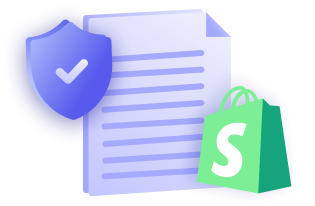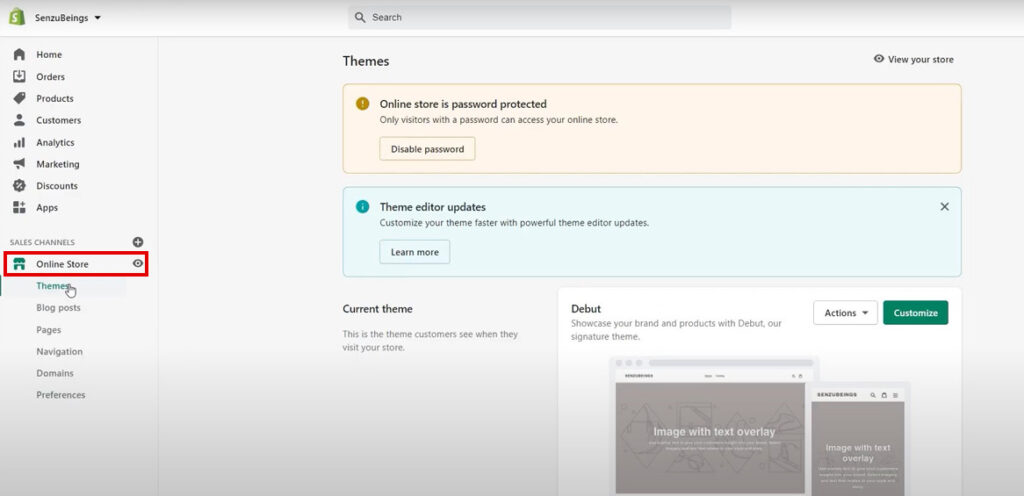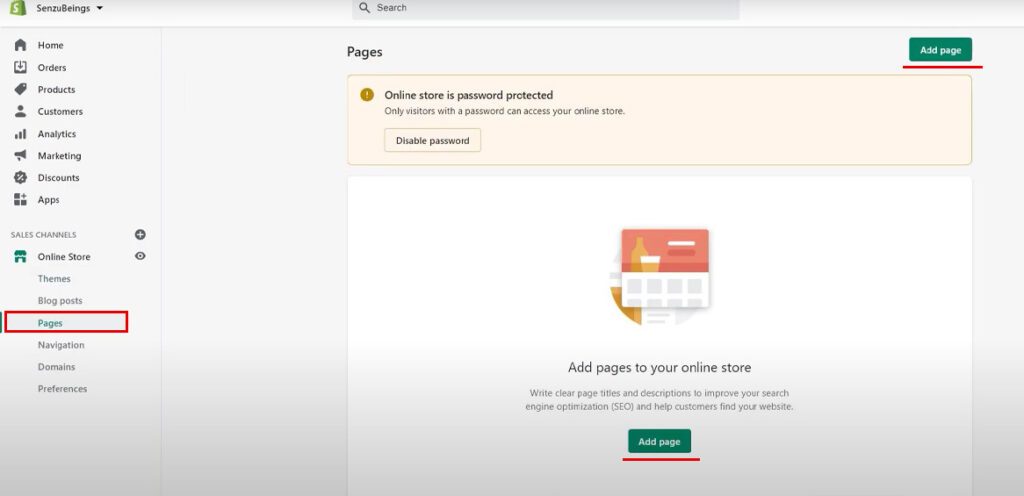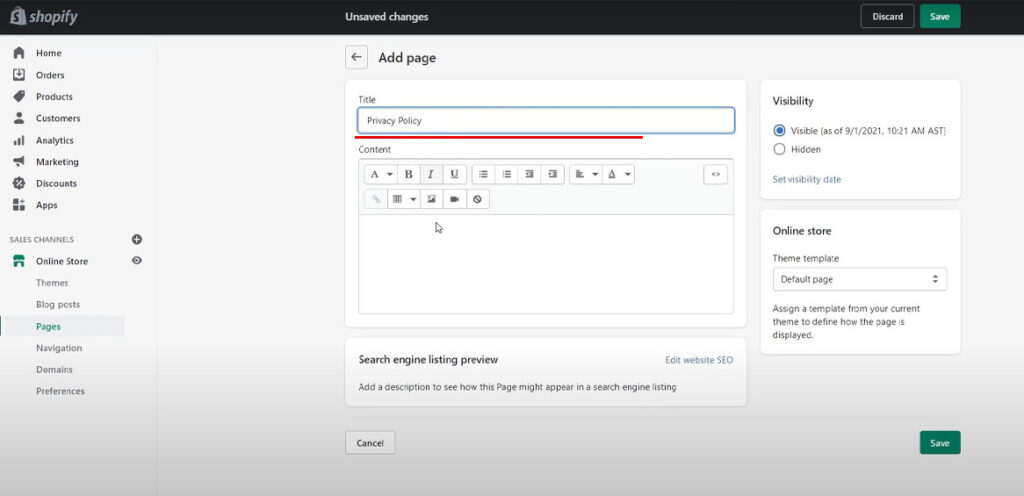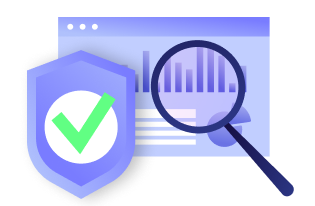As a Shopify store owner, have you ever stopped to consider how you are collecting, using, and protecting the personal information of your customers? If not, it’s time to take a closer look at the importance of having a privacy policy in place for your online store. Not only is it a legal requirement in many countries, but it’s also crucial for building trust with your customers and protecting your business. So, where do you start when it comes to creating a privacy policy for your Shopify store? A trial of Shopify would come in handy as the best test.
Does my Shopify store need a privacy policy?
The internet is one of the most public spaces ever created. The saying “everything on the internet stays there forever” is proof of this. This public nature means that all information, no matter how secure it seems, can potentially be accessed by anyone with the means to do so. It is for this reason that it is important to adhere to the Shopify privacy policy. As an online store, your customers will need to provide their personal information for basic transactions. This information is vulnerable to being compromised and exploited.
Another reason to comply with the privacy policy is due to privacy laws like the General Data Protection Regulation (GDPR) and the California Consumer Privacy Act (CCPA). These acts give citizens in Europe and California more control over their data and allow them to legally challenge businesses that misuse their information.
Both acts are widely respected, so all businesses, including Shopify stores, must follow them. The CCPA is similar to the GDPR, especially concerning transparency. Both acts prioritize transparency in the following areas:
- All ways in which personal data is presented
- The reasons for collecting data
- Potential third parties who can view the data
- The sources of collected data.
Does Shopify collect personal information?
Most likely. The gathering of customer information is a crucial aspect of any online business because it allows for an efficient way of interacting with potential clients. The data collected can be quite vast and can be discussed in depth on its own. However, some of the most important details required during this process include
- Name
- Age
- Email address
- Users’ online behaviors
- Users’ preferences
When done ethically, this practice can result in an overall better experience for all parties involved. So, how do you properly collect data? You can either collect non-personal data that will help provide the same services, or you can obtain user consent to collect their data.
Data privacy regulations have been put in place to govern data collection practices and ensure user privacy is protected. It is the responsibility of online stores that fall under their jurisdiction to abide by these regulations.
How do I add a privacy policy on Shopify?
If you have already set up your Shopify store, you can follow these steps to add a privacy policy:
- Log into your account and go to the admin page. Once there, go to settings and click on the Online Store.
- Click the Pages followed by the Add page button.
- Type “Privacy Policy” in the provided space and click the code icon to reveal the HTML.
- Add your policy text — copy and paste the privacy policy you have created into the provided space.
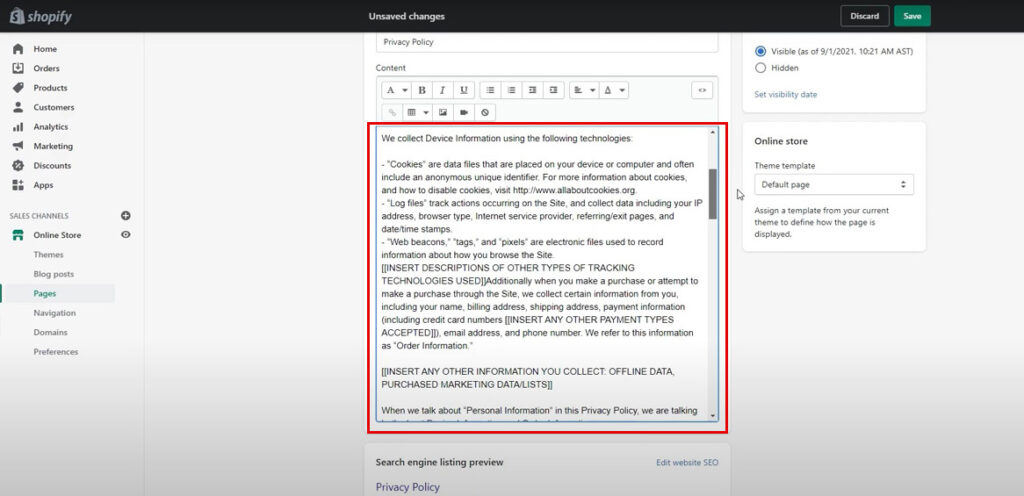
- Click save and you are done.
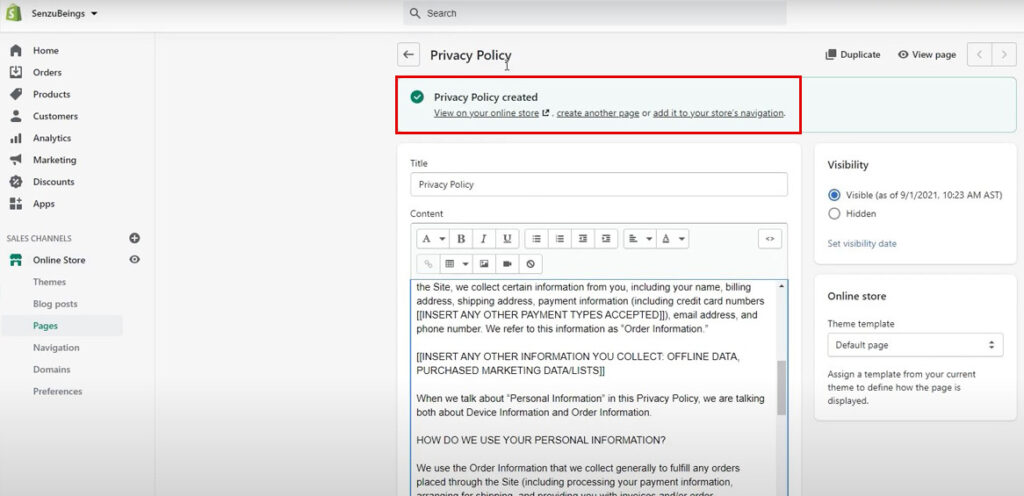
It takes a lot of effort and reviews to get the perfect content to disclose your store’s privacy practices and one that meets all the compliance requirements. Let’s look at what a privacy policy must comprise and how you can create them.
How do I create a privacy policy on Shopify?
Creating a privacy policy for your Shopify store involves considering the sources of customer information and the additional features your platform has. A valid policy should include the following elements:
- The type of personal information collected
- How it is collected and used
- The legal basis for collecting user data
- Any explanation for why it may be shared
- Whether cookies or similar technology will be used
- The length of time the information will be retained
- How the data will be kept secure
- Business contact and details
In addition to these core elements, your privacy policy page for your Shopify store may also include:
- An introduction or background for the section
- Information on how the business will handle rare cases or changes (e.g. expansion or ownership changes)
- User control over data
- Updates to the privacy policy
- Cookies for proper business functioning
- Automatic changes
- Sharing or selling personal data
- Any other relevant subjects that concern users or the business.
Find how to create a legally compliant privacy policy for your store with this e-commerce privacy policy template.
Crafting a privacy policy that addresses all of these points will be easier said than done. You must ensure that you leave no stone unturned to make it legally compliant. You may either get help from an attorney or use an online privacy policy generator. Online generators make it easy for you to set up and generate your website’s privacy policy quickly.
Shopify privacy policy examples
As we continue discussing the importance of a privacy policy for a Shopify store, let’s take a look at a few examples of stores that have likely crafted their policies effectively.
Velasca, the Italian footwear store, has a thorough and well-crafted privacy policy that outlines its data collection practices.
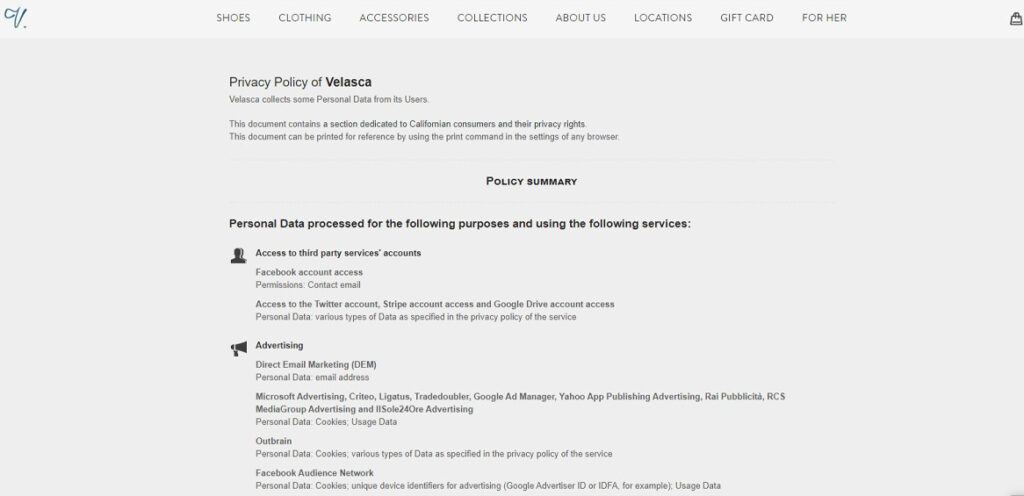
On their website, you can find a detailed explanation of the types of data they collect, as well as information on the legal basis, mode, and place of data processing.
Two other companies that have excellent privacy policies are Terrebleu and Hiutdenim. Both of their websites clearly outline how they use personal data and identify the types of information that they may collect. This transparency helps to ensure that users feel confident in the protection of their personal information.
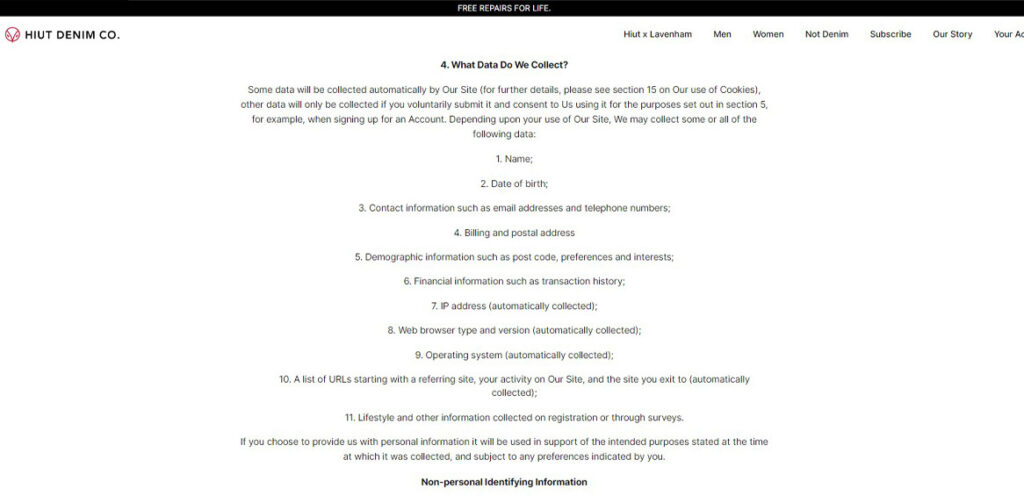
You can see how both privacy policies provide their clients with easy-to-find data and bulleted lists of the types of information they collect and what information you have to automatically share with the site.
Final thoughts
As a business owner, it’s important to consider the benefits of setting up a privacy policy for your online store. You may want to consider hiring a professional to assist with the creation and implementation of your privacy policy. Alternatively, you can use free online privacy policy generators to save time and resources. While it may seem like a hassle in the short term, having a clear and effective policy in place can ultimately lead to increased profits in the long run.
Frequently asked questions
How much does a privacy policy cost?
The cost of creating a privacy policy can vary, but it can be expensive to hire a lawyer or legal firm to make one. If you are a small business, you can try using an online privacy policy generator to create a policy for your website or business. These generators let you easily make a customized privacy policy without needing legal help. These tools can be a cheap and convenient way to make a privacy policy instead of hiring someone to do it for you.
What personal information does Shopify collect?
When creating an account or making a purchase on the platform, Shopify may ask for name, email address, phone number, and mailing address. This information is used to provide services and process transactions.
How is personal information used by Shopify?
Personal information is used to communicate with users about their accounts and orders, personalize the shopping experience, and provide customer support.
Does Shopify share personal information with third parties?
There may be instances when personal information needs to be shared with third parties, such as to process payments or comply with legal requirements. Shopify ensures that any third parties follow the same privacy standards. You can read more about how personal information is shared in their Privacy Policy.
Can users access or delete personal information collected by Shopify?
Yes, personal information can be accessed and updated by logging into the account and accessing account settings. Users may also request that their personal information be deleted by contacting Shopify.
How does Shopify protect personal information?
Shopify takes steps to protect personal information from unauthorized access, use, or disclosure. This includes the use of secure servers and encryption when personal information is transmitted.
Does Shopify use cookies or tracking technologies?
Shopify uses cookies and other tracking technologies to improve platform functionality and enhance the shopping experience. You can learn more about how these technologies are used in Shopify’s Cookie Policy.
Is there a privacy policy in place at Shopify?
Yes, Shopify has a comprehensive Privacy Policy that explains the collection, use, and protection of personal information.
Author bio: Brian Bates is an experienced Outreach specialist at E-commerce Platforms and he has over 5 years of experience. He is passionate about e-commerce and has a deep understanding of the industry. His hobbies include reading, traveling, and staying updated on the latest e-commerce trends and developments.
Disclaimer: This article is for general informational purposes only and should not be taken as legal or professional advice. The views and opinions expressed in this article are solely those of the author and do not necessarily reflect the views of our organization. We do not endorse any products or services mentioned in the article.
